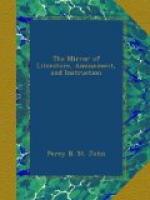gallant steed, and followed by his esquires and men
at arms, rested not either night or day, until he
reached the marches of Wales. The lions of England
still proudly flying over the castle walls, assured
him that the countess had been enabled to hold out
against the savage horde, who surrounded it on all
sides. The besiegers set up a furious yell as
the knight and his party approached their encampment.
Half naked, their eyes glaring wildly from beneath
a mass of yellow hair, and scantily armed with the
rudest species of offensive and defensive weapons,
their numbers alone made them terrible; and had the
castle been manned and victualled, it might have long
defied their utmost strength. Drawing their falchions,
the knight and his party keeping closely together,
and thus forming an impenetrable wedge, cut their
desperate path through the fierce swarm of opposing
foes, who, like incarnate demons, rushed to the onslaught,
and fell in heaps before the biting steel of these
experienced soldiers. Pressing forward with unyielding
bravery, Fitzwalter won the castle walls; whence, with
the assistance of such frail aid as the living spectres
on the battlements could give, he beat back the Welsh
host, and in another quarter of an hour, having dispersed
the enemy with frightful loss, gained free entrance
to the castle. Feeble was the shout of triumph
which welcomed Fitzwalter and his brave companions;
the corpses of the unburied dead lay strewed upon the
pavement; the heroic countess, and her attendant damsels,
clad in the armour of the slain, weakened by famine,
and hopeless of succour, yet still striving to deceive
the besiegers by the display of living warriors, by
this stratagem retarded the assault which they could
not repel. Fitzwalter took advantage of the darkness
of the night, and the panic of the Welshmen, to withdraw
from a fortress which was destitute of all the implements
of war; and with the rescued ladies mounted behind
them, the brave band returned to the court of King
Stephen; and the charms of the fair one, and the valour
of her chivalric defender, formed the theme of the
minstrel in every knightly hall and lady’s bower
throughout Christendom.
* * * *
*
SPIRIT OF THE PUBLIC JOURNALS.
* * * *
*
THE CONFESSIONS OF AN ENGLISH NOVEL READER.
How shall I describe the emotions with which I read
the first novel I ever perused! A school-fellow
had secretly brought with him from home after the
holidays, the novel of Peregrine Pickle, which he carefully
concealed in his trunk. He at first lent it to
some of the elder boys, who read it, and enlarging
on some of the most despicable incidents to be found,
disgusted my meek spirit of it, by their report.
It seemed to violate all my cherished ideas of beauty
and soft luxury. I was then about fourteen years
of age, and my companions persuaded me to a perusal.
I took it up listlessly, expecting but little pleasure,
but what language can paint the manner in which I
was entranced by it? I read it over and over with
increased delight, my entire soul and frame of mind
and passions seemed to be suddenly changed and remodelled.
I forgot Ariadne and Telemachus, and Tom Pipes and
Hatchway became my idols, the undivided objects of
my admiration.




